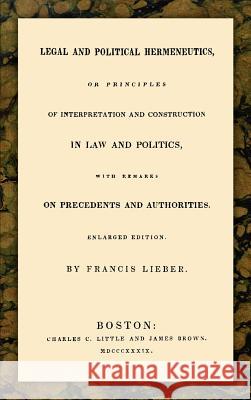Legal and Political Hermeneutics » książka
Legal and Political Hermeneutics
ISBN-13: 9781584772262 / Angielski / Twarda / 2010 / 242 str.
Legal and Political Hermeneutics
ISBN-13: 9781584772262 / Angielski / Twarda / 2010 / 242 str.
(netto: 168,74 VAT: 5%)
Najniższa cena z 30 dni: 100,66
ok. 16-18 dni roboczych.
Darmowa dostawa!
An Important Early Contribution to the Field of Political Science This work received high praise from Chancellor Kent, Henry Clay, Rufus Choate, Joseph Story and others. At the time of publication, there was a great deal of debate about the interpretation of the United States Constitution, and this book is Lieber's contribution to the mix. He asserts that Constitutions should be construed closely, since their words were carefully measured, and distinguishes between interpretation ("the art of finding out the true sense of any form of words") and construction as the drawing of conclusions respecting the subjects that lie outside the direct expression of the text. Francis Lieber was a Prussian scholar and political activist who was persecuted there for his liberalism. He emigrated to the United States in 1827, and his writings, among them an encyclopedia that was the foundation of the Encyclopedia Britannica, advanced his reputation. He became professor of history and political economy at South Carolina College, and was later appointed to the same chair at Columbia College. In 1865 he moved to Columbia Law School, where he was renowned as a prominent political philosopher. He is also known for his assistance to Abraham Lincoln in drafting legal guidelines of humane conduct for the Union army, the most well-known being General Orders Number 100, or the "Lieber Code," which went on to be adopted by other military organizations, and was influential as the basis for international law treaties such as the Hague Regulations of 1907.
An Important Early Contribution to the Field of Political ScienceThis work received high praise from Chancellor Kent, Henry Clay, Rufus Choate, Joseph Story and others. At the time of publication, there was a great deal of debate about the interpretation of the United States Constitution, and this book is Liebers contribution to the mix. He asserts that Constitutions should be construed closely, since their words were carefully measured, and distinguishes between interpretation ("the art of finding out the true sense of any form of words") and construction as the drawing of conclusions respecting the subjects that lie outside the direct expression of the text. Francis Lieber was a Prussian scholar and political activist who was persecuted there for his liberalism. He emigrated to the United States in 1827, and his writings, among them an encyclopedia that was the foundation of the Encyclopedia Britannica, advanced his reputation. He became professor of history and political economy at South Carolina College, and was later appointed to the same chair at Columbia College. In 1865 he moved to Columbia Law School, where he was renowned as a prominent political philosopher. He is also known for his assistance to Abraham Lincoln in drafting legal guidelines of humane conduct for the Union army, the most well-known being General Orders Number 100, or the "Lieber Code," which went on to be adopted by other military organizations, and was influential as the basis for international law treaties such as the Hague Regulations of 1907.











